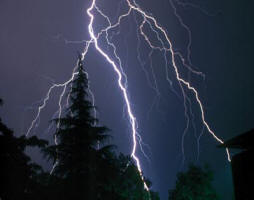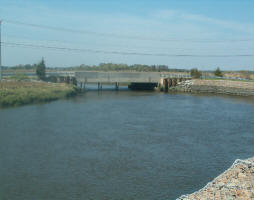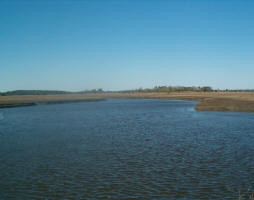 Israel, Jordan Find Accord in Finding New Water Supplies:Controversial Projects Include Network Linking the Dead Sea and the Red Sea
Israel, Jordan Find Accord in Finding New Water Supplies:Controversial Projects Include Network Linking the Dead Sea and the Red Sea
An acute water shortage has prompted Jordan and Israel to embark on audacious water-supply projects that supporters say will prevent an impending regional crisis but environmentalists have criticized as ill-advised attempts to rewire nature.
The efforts include a pipeline to Amman from the Dissi Reservoir in Jordan's southern desert and an extensive network of desalination plants Israel is building along the Mediterranean coast. The Dissi is an ancient, nonrenewable, underground pool of water that, once tapped, will run dry in an estimated 50 years.
Most controversially, the two countries are pushing for action on the long-standing idea of cutting a 110-mile path north from the Red Sea to the Dead Sea. Nearly 2 billion cubic meters of water -- about half a trillion gallons -- would be sent through a network of pipelines or tunnels each year, with some of it desalinated en route and some used to reverse decades of decline in the Dead Sea's water level. The historic water body, the lowest point on the Earth's surface and a major tourist and industrial asset because of its unique chemistry, is dropping by about three feet a year due to evaporation and the fact that its upstream sources, chiefly the Jordan River, have been heavily dammed.
Water is a major source of contention in the Middle East, whether it is tension over Egypt's concerns about Sudan's management of the southern Nile or disputes between Israel and the Palestinian Authority over shortages in the occupied West Bank. The water shortage is severe enough to upend some of the region's traditional dynamics. Jordan and Israel are often pressured by Western nations and international organizations to cooperate in the name of Arab-Israeli peace. Water is one area in which pressure is running in the other direction, with the two pushing quickly on the Red Sea-Dead Sea connection while outside observers urge restraint.
Jordan now views the connection as central to the long-term stability of its water supply. Upset over the years spent discussing the project without concrete action, the country in the spring announced plans to proceed on its own. Israel has since said it would join its neighbor in an initial phase, even as the World Bank and environmental groups foresee perhaps two more years for studies to be completed before deciding whether the project should be built at all.
The projects being planned stem from an atmosphere of intense concern -- particularly in Jordan -- that a multiyear drought and a steady rise in residential, industrial and agricultural demand have made chronic shortages and rationing inevitable unless more water is produced. In the case of Jordan, landlocked and downstream of dams built long ago by Israel, Syria and Turkey on the region's major rivers, the country's dozen or so freshwater aquifers are being exhausted from overuse, with perhaps 20 years or less before they are spent, according to Jordanian officials and water experts.
Utility rates are rising, supplies are spotty in some Jordanian villages, and the farm economy -- from the kibbutzim that helped Israel "make the desert bloom" to the plantations spread along both sides of the Jordan Valley -- is being challenged to pay more for water and to shift from tropical fruits and standard produce to crops more appropriate to a desert climate.
Farms in both countries send abroad much of what they raise, using a long growing season to provide fresh produce to European markets during the winter and, in Jordan's case, to supply neighboring Persian Gulf countries.
Environmental groups say agriculture, in essence, is exporting what may be the region's most vital resource: water.
Investing in huge water- supply plants while shipping overseas tons of potatoes and carrots and other crops "is using a traditional fix instead of adapting behavior" to the climate, said Gidon Blomberg, head of Israel's branch of Friends of the Earth Middle East. "There's a sense among the heads of the water authorities that we want to look like Europe and the U.S. We want to have a garden. It's very much part of the ethos, that we can do better than nature."
| Contact information |
Howard Schneider, Washington Post Foreign Service
|
|---|---|
| News type | Inbrief |
| File link |
http://www.washingtonpost.com/wp-dyn/content/article/2009/09/04/AR2009090403775.html |
| Source of information | Washington Post |
| Keyword(s) | Water Supplies |
| Subject(s) | AGRICULTURE , DRINKING WATER , DRINKING WATER AND SANITATION : COMMON PROCESSES OF PURIFICATION AND TREATMENT , HYDRAULICS - HYDROLOGY , INFRASTRUCTURES , NATURAL MEDIUM , POLICY-WATER POLICY AND WATER MANAGEMENT , PREVENTION AND NUISANCES POLLUTION , RIGHT , RISKS AND CLIMATOLOGY , WATER DEMAND |
| Geographical coverage | Israel, Jordan, Egypt, Sudan, Palestine |
| News date | 08/09/2009 |
| Working language(s) | ENGLISH |
 you are not logged in
you are not logged in





